外研版九年级下册Module 2 Education Unit 3 Grammar课件(共32张PPT)
文档属性
| 名称 | 外研版九年级下册Module 2 Education Unit 3 Grammar课件(共32张PPT) |
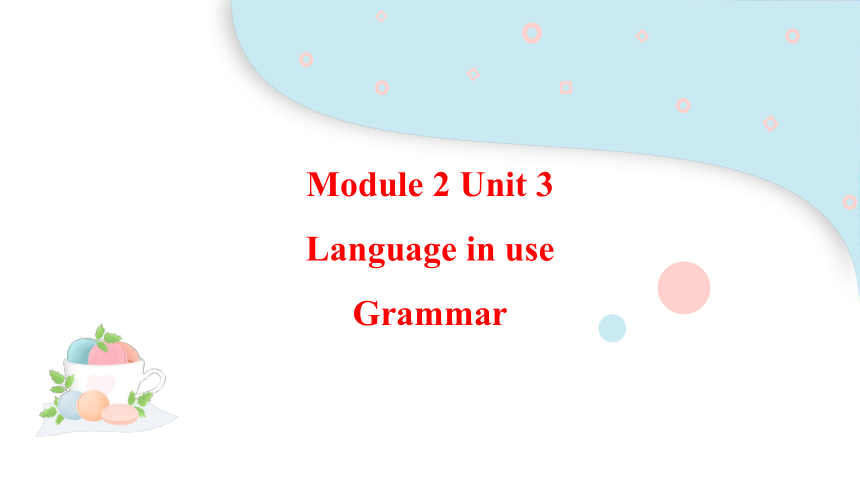
|
|
| 格式 | pptx | ||
| 文件大小 | 779.1KB | ||
| 资源类型 | 教案 | ||
| 版本资源 | 外研版 | ||
| 科目 | 英语 | ||
| 更新时间 | 2025-04-27 00:00:00 | ||
图片预览

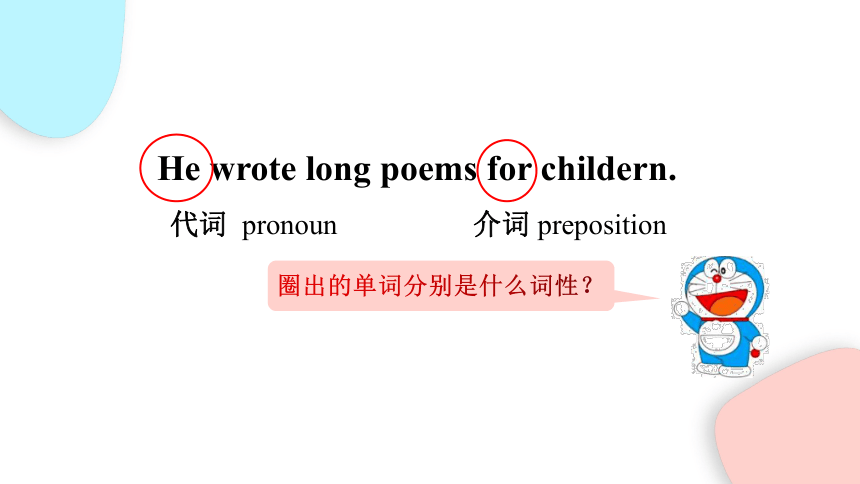
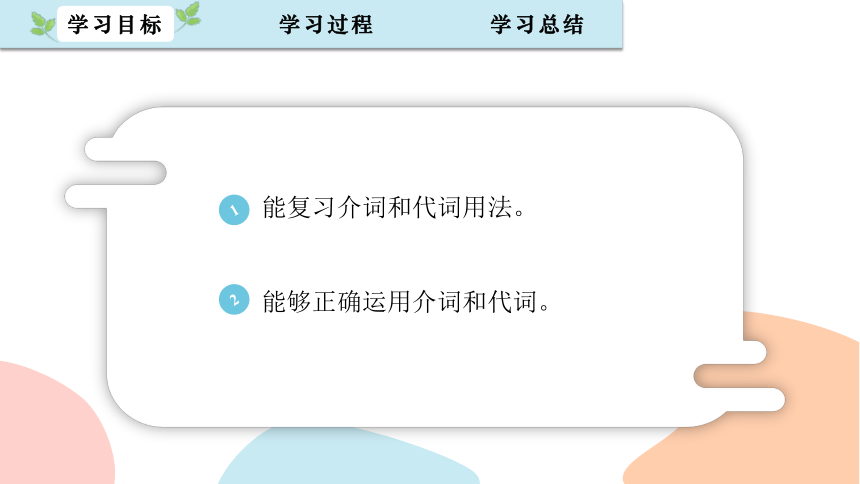
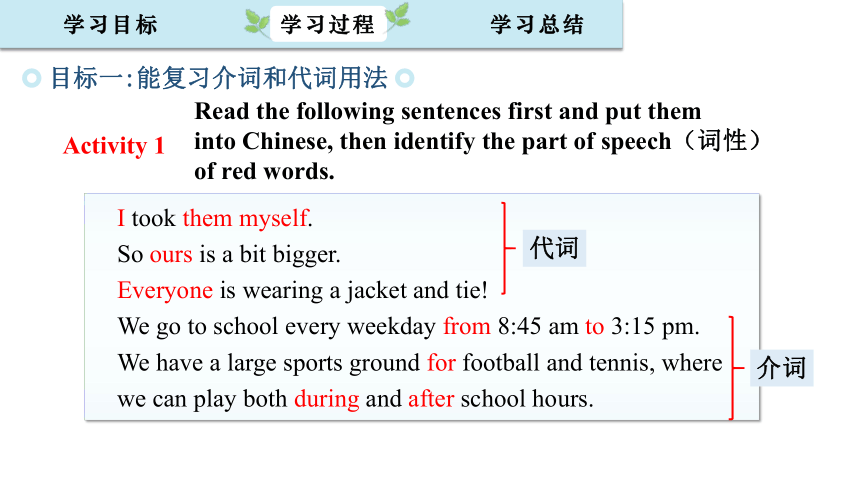

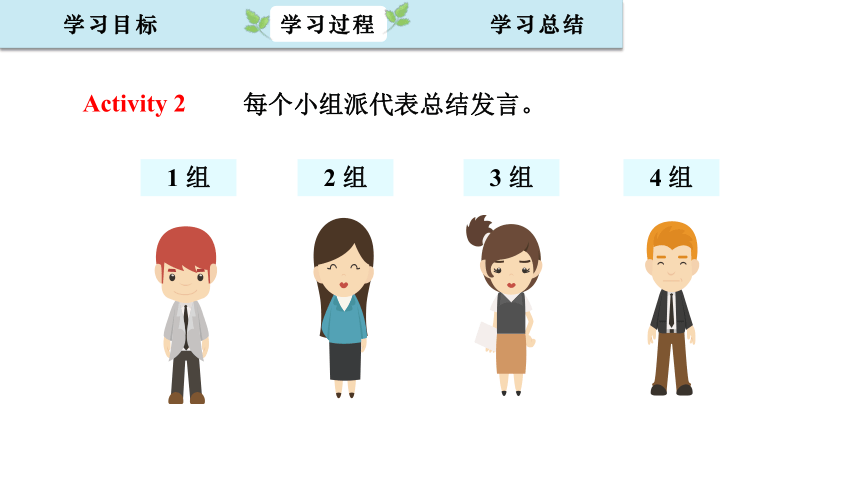
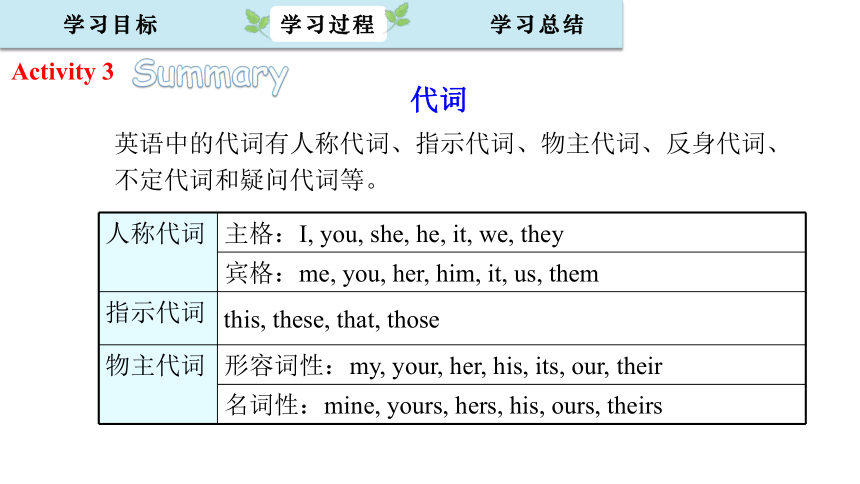

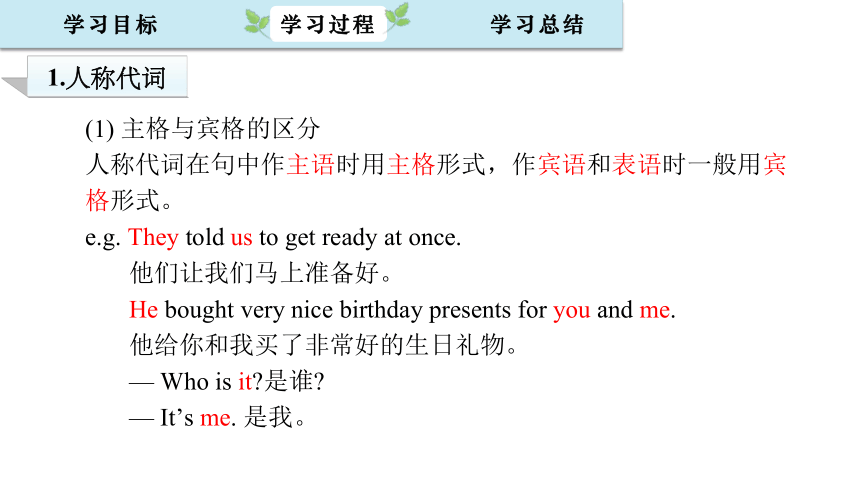
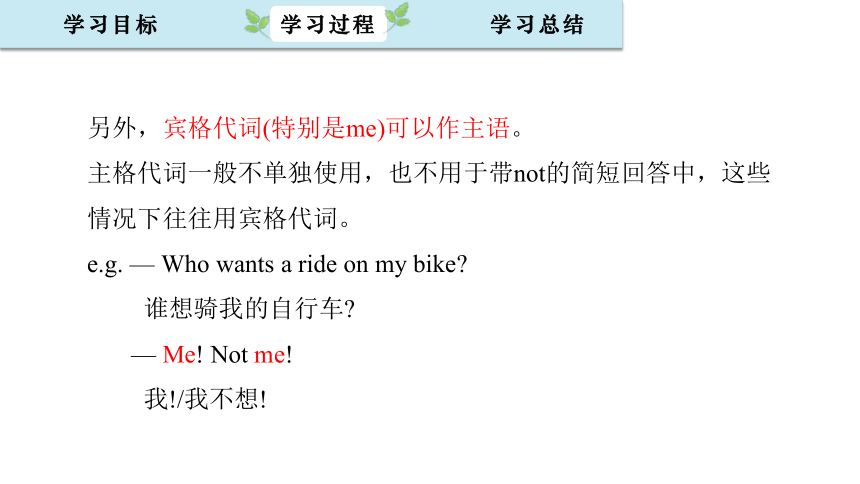
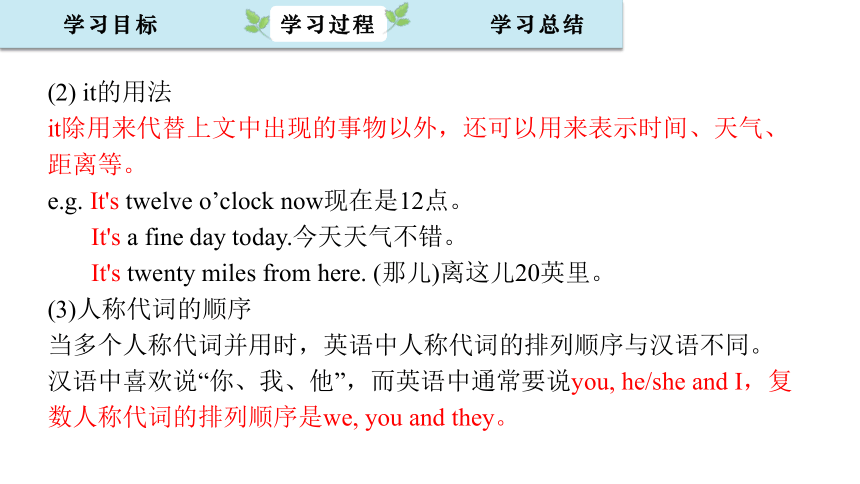
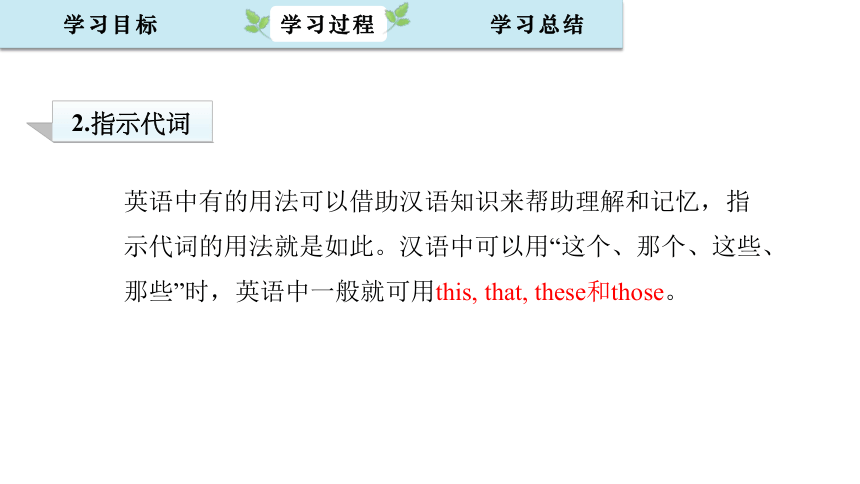
文档简介
(共32张PPT)
Module 2 Unit 3
Language in use
Grammar
He wrote long poems for childern.
圈出的单词分别是什么词性?
代词 pronoun
介词 preposition
1
2
能复习介词和代词用法。
能够正确运用介词和代词。
目标一:能复习介词和代词用法
Activity 1
Read the following sentences first and put them
into Chinese, then identify the part of speech(词性) of red words.
I took them myself.
So ours is a bit bigger.
Everyone is wearing a jacket and tie!
We go to school every weekday from 8:45 am to 3:15 pm.
We have a large sports ground for football and tennis, where we can play both during and after school hours.
代词
介词
Group
Discussion
小组合作观察每个句子,讨论、总结并分组展示。
Task 1: 查阅相关资料复习总结代词的用法;
Task 2: 查阅相关资料复习总结介词的用法;
I took them myself.
So ours is a bit bigger.
Everyone is wearing a jacket and tie!
We go to school every weekday from 8:45 am to 3:15 pm.
We have a large sports ground for football and tennis, where we can play both during and after school hours.
Activity 2
每个小组派代表总结发言。
1 组
2 组
3 组
4 组
Activity 3
Summary
英语中的代词有人称代词、指示代词、物主代词、反身代词、不定代词和疑问代词等。
人称代词 主格:I, you, she, he, it, we, they
宾格:me, you, her, him, it, us, them
指示代词 this, these, that, those
物主代词 形容词性:my, your, her, his, its, our, their
名词性:mine, yours, hers, his, ours, theirs
代词
反身代词 myself, yourself, herself, himself, itself, ourselves, yourselves, themselves
不定代词 some, any, both, either, neither, all, none, each, every, many, much, few, a few, little, a little, other, another, one, somebody, nobody, anybody, everyone, everything, something, anything, nothing等
疑问代词 what, which, who, whom, whose等
1.人称代词
(1) 主格与宾格的区分
人称代词在句中作主语时用主格形式,作宾语和表语时一般用宾格形式。
e.g. They told us to get ready at once.
他们让我们马上准备好。
He bought very nice birthday presents for you and me.
他给你和我买了非常好的生日礼物。
— Who is it 是谁
— It’s me. 是我。
另外,宾格代词(特别是me)可以作主语。
主格代词一般不单独使用,也不用于带not的简短回答中,这些情况下往往用宾格代词。
e.g. — Who wants a ride on my bike
谁想骑我的自行车
— Me! Not me!
我!/我不想!
(2) it的用法
it除用来代替上文中出现的事物以外,还可以用来表示时间、天气、距离等。
e.g. It's twelve o’clock now现在是12点。
It's a fine day today.今天天气不错。
It's twenty miles from here. (那儿)离这儿20英里。
(3)人称代词的顺序
当多个人称代词并用时,英语中人称代词的排列顺序与汉语不同。汉语中喜欢说“你、我、他”,而英语中通常要说you, he/she and I,复数人称代词的排列顺序是we, you and they。
2.指示代词
英语中有的用法可以借助汉语知识来帮助理解和记忆,指示代词的用法就是如此。汉语中可以用“这个、那个、这些、那些”时,英语中一般就可用this, that, these和those。
3.物主代词
物主代词包括形容词性物主代词和名词性物主代词。
名词性物主代词从意思上讲相当于“形容词性物主代词+名词”,其作用与名词相同。要特别注意his,这个代词既可以是形容词性物主代词,也可以是名词性物主代词。
e.g. This is his dictionary. 这是他的字典。
The dictionary is his. 这本字典是他的。
His is the newest dictionary in our class.
他的字典是我们班最新的。
4.反身代词
英语中的反身代词在句中常作宾语和同位语。注意下面句子中反身代词的用法。
e.g. She hurt herself when she fell.
她摔倒的时候把自己伤着了。(宾语)
May I introduce myself 我可以自我介绍一下吗 (宾语)
You may go and ask the teacher himself!
你可以去问老师本人。(同位语,加强语气)
You must do it yourself!你必须自己做。(同位语,加强语气)
5.不定代词
英语中不定代词很多,用法也比较灵活,这里只介绍常用的几个。
(1)some和any
some和any都表示“一些”,可以指人或其他可数的东西,也可以指不可数的东西,可用作主语、宾语,some多用于肯定句,any多用于疑问句、否定句和条件句。
e.g. Some of the students can speak German.有些学生会说德语。
He had a lot of music CDs. Did he lend you any
他有很多音乐光盘。他借给你一些了吗
(2) neither和none
neither和none都表示否定的意思,它们的区别在于: neither表示对两者的否定,而none用于表示对三者及以上的否定。
e.g. I saw two boys at the door, but neither (of them) is my brother.
我看到门口有两个男孩,但他们都不是我哥哥(弟弟)。
None (of the students) in my class wants/want to take part in this trip.
我们班没有学生想参加这次旅行。
另外,none除指可数的人和物外,还可以表示不可数的东西。none还可以表示“零”这一数字概念。
e.g. I have a lot of money in my bag, but none is mine.
我的包里有很多钱,但都不是我的。
— How many postcards have you sent 你寄出了多少张明信片
— None.一张都没寄。
(3) (a) little和(a)few
表示数量的代词很多,这里只对(a)little和(a)few作简单介绍。对于这一组代词是要区分有冠词与无冠词的不同,二是要区分 little与few的不同。
a little和a few表示肯定的概念,而little和few表示否定的概念。
e.g. — Do you have any water 你有水吗
—Yes, but only a little. 有,但只有一点儿。
Little is known about these areas of Mars.
人类不太了解火星上的这些地区。
He has many friend, but few are true friends/ but only a few are true friends.
他有很多朋友,却没有几个真正的朋友/却只有几个真正的朋友。
如以上各例句所示,(a) little用于不可数名词,而(a) few用于可数名词。
(4) both和all
both表示“两者都”,而all表示“全体,一切”,指三者及以上。all还可以指不可数的事物。
e.g. — Which of the two shirts do you like 这两件衬衫你喜欢哪件
— I like both. 两件都喜欢。
All of the boys went to the cinema yesterday evening.
昨晚所有的男孩都去看电影了。
All was changed.一切都被改变了。
both和all还可以用于主语之后。
e.g. We both/all passed the exam. 我们俩/大家都通过了考试。
(5) each和 either
each与 either都可以表示“每一个”,each可以表示两者或两者以上中的“每一个”,而 either只能表示两者中的“每一个”。
e.g. Each of us/ We each got a beautiful card on that special day.
在那个特殊的日子,我们每个人都得到了一张漂亮的卡片。
— Which of the two shirts do you want
这两件衬衫你想要哪件
— Either will do. 哪件都行。
【注意】either表示二选一,如上面一例,表示“哪个都可以”,说明购物者要买一件衬衣而不是两件都要。如表示两件都要,则用both。
6.疑问代词
疑问代词用于构成特殊疑问句,包括what, which, who, whom, whose等,代词的选择根据句意要求而定。
介词与介词短语
介词是一种用来表示人物、事件之间关系的词。介词是一种虚词,不能独立存在,需要与其他成分一起构成介词短语用于句中。介词分类如下:
介词不能单独构成句子成分,必须以介词短语的形式来构成句子成分。这里重点介绍由“介词+名词”构成的介词短语,如 in the park, by car, on Saturday, in front of the classroom等。这类介词短语在句中可以作状语、定语和表语等。
1.介词短语及用法
在本模块中,我们将重点介绍介词短语的使用和介词的兼词现象。
(1) 作状语
e.g. The space pen worked in space, under water, even on ice.
太空笔可以在太空中、水下,甚至冰上使用。
He wrote long poems for children.他给孩子们写长诗。
(2)作定语
e.g. He seems to know the solution to the problem.
他似乎知道这问题的解决办法。
We had a debate about women's lives now and in the past.
我们就妇女现在与过去的生活状况展开了一场辩论。
(3) 作表语
e.g. Tom and Jack are from England.
汤姆和杰克来自英格兰。
Our manager is on holiday in the south.
我们经理正在南方度假。
许多介词短语已经成为固定表达方式,我们可以把它们作为一个整体来记忆和使用,如 in the past, in the morning, at the weekend, after school等。
2.介词的兼词现象
有些单词既可以用作连词也可以用作介词,而有些单词既可以用作介词又可以用作副词,应注意区分它们在句子中的不同功能。例如:
(1)after 和before after和before两词既可以作连词,也可以作介词。作连词时后面接从句,作介词时后面接名词或动词的-ing形式。例如:What did you do after you called the police?报警之后,你做了些什么?(after为连词,连接状语从句)
I am going to the playground to play basketball after school.课后我要去操场打篮球。
(after为介词,与名词school构成介词短语作状语)
试比较下面两句话:
You should take off your shoes before you go into a Japanese home.
You should take off your shoes before going into a Japanese home.
以上两句意思相同,都表示“去拜访日本家庭的时候,入室前要脱鞋”,但是第一句中before为连词,而第二句中before为介词。
(2)above和below
above和below 可以作介词,也可以作副词。
例如:Do not write below the line.请勿写在线下。(below和the line 构成介词短语作状语)
Please write to me at the address below.请按照下面的地址给我写信。(below为副词)
英语中兼作介词和副词的单词很多,如about,behind,down,up,in,off,on,over,through,under 等
目标二:能够正确运用介词和代词
Activity 1
1
Underline the correct words.
Anna: Hi, Bob. How did your exams go last term
Bob: Great! I got good marks in (1) both / each maths and geography. What about you
Anna: I did really well in English. That’s (2) anything / something I’ve always enjoyed.
My marks in history and art weren’t so good because (3) none / neither is my
favourite subject. What will you study this term
Bob: I’ve still got (4) a few / few days before I have to decide. I’m going to speak to (5)
both / all my teachers and ask for their advice.
Anna: The teachers say that we must decide for (6) themselves /ourselves and that (7) none /
neither of them can tell us what to do.
Bob: But I have to get (8) some / any information because there are so (9) much / many
subjects and it’s very hard to choose.
2
Complete the passage with the words and expression in the box.
both each other His mine myself
A good teacher is someone who is helpful and kind, like my history teacher, Mr. Miller. (1) _________ knowledge of the subject is excellent. Because of him, I love history and even read history books by (2) _________ after the lessons. A friend of (3) _________ called Mark also loves this subject and sometimes we lend (4) _________ books or DVDs about history. I like reading (5) _______Western and Chinese history books, but I think Chinese history is my favourite subject.
His
myself
mine
each other
both
3
Complete the sentences with the correct form of the words in the box.
he her him himself our she their themselves they us we
1. John’s homework is too difficult. ___ is not able to do it _________, so I’m going to help ______ with it.
2. Some people do not have time to wash ______ pets __________, so ______ pay someone to do it at the pet shop.
3. — Jane is doing a project about family history. ______ has asked us to give ______ some of ______ photos that were taken when we were young. Have ______ got any, Becky
— Yes, there is a photo of ______ with all the children in our family.
He
himself
him
their
themselves
they
She
her
our
we
us
4
Complete the passage with the words in the box. You need to use one word more than once.
Activity 2
at for in on
The school cinema shows lots of foreign films. Next week (1) ___ Friday and Sunday it is showing a French film called Never Say Goodbye. The story is set (2) ___ Paris (3) ___ the 1960s. The film lasts two hours and fifteen minutes and starts (4) ___ 6:30 and 9:30 (5) ___ the evenings. Tickets are 5, but there is a special half-price ticket (6) ___ students from our school. Please bring your student card if you want a cheap ticket.
on
in
in
at
in
for
综合上述目标,说说我们今天的收获。
学习目标
1
2
能复习介词和代词用法。
能够正确运用介词和代词。
Module 2 Unit 3
Language in use
Grammar
He wrote long poems for childern.
圈出的单词分别是什么词性?
代词 pronoun
介词 preposition
1
2
能复习介词和代词用法。
能够正确运用介词和代词。
目标一:能复习介词和代词用法
Activity 1
Read the following sentences first and put them
into Chinese, then identify the part of speech(词性) of red words.
I took them myself.
So ours is a bit bigger.
Everyone is wearing a jacket and tie!
We go to school every weekday from 8:45 am to 3:15 pm.
We have a large sports ground for football and tennis, where we can play both during and after school hours.
代词
介词
Group
Discussion
小组合作观察每个句子,讨论、总结并分组展示。
Task 1: 查阅相关资料复习总结代词的用法;
Task 2: 查阅相关资料复习总结介词的用法;
I took them myself.
So ours is a bit bigger.
Everyone is wearing a jacket and tie!
We go to school every weekday from 8:45 am to 3:15 pm.
We have a large sports ground for football and tennis, where we can play both during and after school hours.
Activity 2
每个小组派代表总结发言。
1 组
2 组
3 组
4 组
Activity 3
Summary
英语中的代词有人称代词、指示代词、物主代词、反身代词、不定代词和疑问代词等。
人称代词 主格:I, you, she, he, it, we, they
宾格:me, you, her, him, it, us, them
指示代词 this, these, that, those
物主代词 形容词性:my, your, her, his, its, our, their
名词性:mine, yours, hers, his, ours, theirs
代词
反身代词 myself, yourself, herself, himself, itself, ourselves, yourselves, themselves
不定代词 some, any, both, either, neither, all, none, each, every, many, much, few, a few, little, a little, other, another, one, somebody, nobody, anybody, everyone, everything, something, anything, nothing等
疑问代词 what, which, who, whom, whose等
1.人称代词
(1) 主格与宾格的区分
人称代词在句中作主语时用主格形式,作宾语和表语时一般用宾格形式。
e.g. They told us to get ready at once.
他们让我们马上准备好。
He bought very nice birthday presents for you and me.
他给你和我买了非常好的生日礼物。
— Who is it 是谁
— It’s me. 是我。
另外,宾格代词(特别是me)可以作主语。
主格代词一般不单独使用,也不用于带not的简短回答中,这些情况下往往用宾格代词。
e.g. — Who wants a ride on my bike
谁想骑我的自行车
— Me! Not me!
我!/我不想!
(2) it的用法
it除用来代替上文中出现的事物以外,还可以用来表示时间、天气、距离等。
e.g. It's twelve o’clock now现在是12点。
It's a fine day today.今天天气不错。
It's twenty miles from here. (那儿)离这儿20英里。
(3)人称代词的顺序
当多个人称代词并用时,英语中人称代词的排列顺序与汉语不同。汉语中喜欢说“你、我、他”,而英语中通常要说you, he/she and I,复数人称代词的排列顺序是we, you and they。
2.指示代词
英语中有的用法可以借助汉语知识来帮助理解和记忆,指示代词的用法就是如此。汉语中可以用“这个、那个、这些、那些”时,英语中一般就可用this, that, these和those。
3.物主代词
物主代词包括形容词性物主代词和名词性物主代词。
名词性物主代词从意思上讲相当于“形容词性物主代词+名词”,其作用与名词相同。要特别注意his,这个代词既可以是形容词性物主代词,也可以是名词性物主代词。
e.g. This is his dictionary. 这是他的字典。
The dictionary is his. 这本字典是他的。
His is the newest dictionary in our class.
他的字典是我们班最新的。
4.反身代词
英语中的反身代词在句中常作宾语和同位语。注意下面句子中反身代词的用法。
e.g. She hurt herself when she fell.
她摔倒的时候把自己伤着了。(宾语)
May I introduce myself 我可以自我介绍一下吗 (宾语)
You may go and ask the teacher himself!
你可以去问老师本人。(同位语,加强语气)
You must do it yourself!你必须自己做。(同位语,加强语气)
5.不定代词
英语中不定代词很多,用法也比较灵活,这里只介绍常用的几个。
(1)some和any
some和any都表示“一些”,可以指人或其他可数的东西,也可以指不可数的东西,可用作主语、宾语,some多用于肯定句,any多用于疑问句、否定句和条件句。
e.g. Some of the students can speak German.有些学生会说德语。
He had a lot of music CDs. Did he lend you any
他有很多音乐光盘。他借给你一些了吗
(2) neither和none
neither和none都表示否定的意思,它们的区别在于: neither表示对两者的否定,而none用于表示对三者及以上的否定。
e.g. I saw two boys at the door, but neither (of them) is my brother.
我看到门口有两个男孩,但他们都不是我哥哥(弟弟)。
None (of the students) in my class wants/want to take part in this trip.
我们班没有学生想参加这次旅行。
另外,none除指可数的人和物外,还可以表示不可数的东西。none还可以表示“零”这一数字概念。
e.g. I have a lot of money in my bag, but none is mine.
我的包里有很多钱,但都不是我的。
— How many postcards have you sent 你寄出了多少张明信片
— None.一张都没寄。
(3) (a) little和(a)few
表示数量的代词很多,这里只对(a)little和(a)few作简单介绍。对于这一组代词是要区分有冠词与无冠词的不同,二是要区分 little与few的不同。
a little和a few表示肯定的概念,而little和few表示否定的概念。
e.g. — Do you have any water 你有水吗
—Yes, but only a little. 有,但只有一点儿。
Little is known about these areas of Mars.
人类不太了解火星上的这些地区。
He has many friend, but few are true friends/ but only a few are true friends.
他有很多朋友,却没有几个真正的朋友/却只有几个真正的朋友。
如以上各例句所示,(a) little用于不可数名词,而(a) few用于可数名词。
(4) both和all
both表示“两者都”,而all表示“全体,一切”,指三者及以上。all还可以指不可数的事物。
e.g. — Which of the two shirts do you like 这两件衬衫你喜欢哪件
— I like both. 两件都喜欢。
All of the boys went to the cinema yesterday evening.
昨晚所有的男孩都去看电影了。
All was changed.一切都被改变了。
both和all还可以用于主语之后。
e.g. We both/all passed the exam. 我们俩/大家都通过了考试。
(5) each和 either
each与 either都可以表示“每一个”,each可以表示两者或两者以上中的“每一个”,而 either只能表示两者中的“每一个”。
e.g. Each of us/ We each got a beautiful card on that special day.
在那个特殊的日子,我们每个人都得到了一张漂亮的卡片。
— Which of the two shirts do you want
这两件衬衫你想要哪件
— Either will do. 哪件都行。
【注意】either表示二选一,如上面一例,表示“哪个都可以”,说明购物者要买一件衬衣而不是两件都要。如表示两件都要,则用both。
6.疑问代词
疑问代词用于构成特殊疑问句,包括what, which, who, whom, whose等,代词的选择根据句意要求而定。
介词与介词短语
介词是一种用来表示人物、事件之间关系的词。介词是一种虚词,不能独立存在,需要与其他成分一起构成介词短语用于句中。介词分类如下:
介词不能单独构成句子成分,必须以介词短语的形式来构成句子成分。这里重点介绍由“介词+名词”构成的介词短语,如 in the park, by car, on Saturday, in front of the classroom等。这类介词短语在句中可以作状语、定语和表语等。
1.介词短语及用法
在本模块中,我们将重点介绍介词短语的使用和介词的兼词现象。
(1) 作状语
e.g. The space pen worked in space, under water, even on ice.
太空笔可以在太空中、水下,甚至冰上使用。
He wrote long poems for children.他给孩子们写长诗。
(2)作定语
e.g. He seems to know the solution to the problem.
他似乎知道这问题的解决办法。
We had a debate about women's lives now and in the past.
我们就妇女现在与过去的生活状况展开了一场辩论。
(3) 作表语
e.g. Tom and Jack are from England.
汤姆和杰克来自英格兰。
Our manager is on holiday in the south.
我们经理正在南方度假。
许多介词短语已经成为固定表达方式,我们可以把它们作为一个整体来记忆和使用,如 in the past, in the morning, at the weekend, after school等。
2.介词的兼词现象
有些单词既可以用作连词也可以用作介词,而有些单词既可以用作介词又可以用作副词,应注意区分它们在句子中的不同功能。例如:
(1)after 和before after和before两词既可以作连词,也可以作介词。作连词时后面接从句,作介词时后面接名词或动词的-ing形式。例如:What did you do after you called the police?报警之后,你做了些什么?(after为连词,连接状语从句)
I am going to the playground to play basketball after school.课后我要去操场打篮球。
(after为介词,与名词school构成介词短语作状语)
试比较下面两句话:
You should take off your shoes before you go into a Japanese home.
You should take off your shoes before going into a Japanese home.
以上两句意思相同,都表示“去拜访日本家庭的时候,入室前要脱鞋”,但是第一句中before为连词,而第二句中before为介词。
(2)above和below
above和below 可以作介词,也可以作副词。
例如:Do not write below the line.请勿写在线下。(below和the line 构成介词短语作状语)
Please write to me at the address below.请按照下面的地址给我写信。(below为副词)
英语中兼作介词和副词的单词很多,如about,behind,down,up,in,off,on,over,through,under 等
目标二:能够正确运用介词和代词
Activity 1
1
Underline the correct words.
Anna: Hi, Bob. How did your exams go last term
Bob: Great! I got good marks in (1) both / each maths and geography. What about you
Anna: I did really well in English. That’s (2) anything / something I’ve always enjoyed.
My marks in history and art weren’t so good because (3) none / neither is my
favourite subject. What will you study this term
Bob: I’ve still got (4) a few / few days before I have to decide. I’m going to speak to (5)
both / all my teachers and ask for their advice.
Anna: The teachers say that we must decide for (6) themselves /ourselves and that (7) none /
neither of them can tell us what to do.
Bob: But I have to get (8) some / any information because there are so (9) much / many
subjects and it’s very hard to choose.
2
Complete the passage with the words and expression in the box.
both each other His mine myself
A good teacher is someone who is helpful and kind, like my history teacher, Mr. Miller. (1) _________ knowledge of the subject is excellent. Because of him, I love history and even read history books by (2) _________ after the lessons. A friend of (3) _________ called Mark also loves this subject and sometimes we lend (4) _________ books or DVDs about history. I like reading (5) _______Western and Chinese history books, but I think Chinese history is my favourite subject.
His
myself
mine
each other
both
3
Complete the sentences with the correct form of the words in the box.
he her him himself our she their themselves they us we
1. John’s homework is too difficult. ___ is not able to do it _________, so I’m going to help ______ with it.
2. Some people do not have time to wash ______ pets __________, so ______ pay someone to do it at the pet shop.
3. — Jane is doing a project about family history. ______ has asked us to give ______ some of ______ photos that were taken when we were young. Have ______ got any, Becky
— Yes, there is a photo of ______ with all the children in our family.
He
himself
him
their
themselves
they
She
her
our
we
us
4
Complete the passage with the words in the box. You need to use one word more than once.
Activity 2
at for in on
The school cinema shows lots of foreign films. Next week (1) ___ Friday and Sunday it is showing a French film called Never Say Goodbye. The story is set (2) ___ Paris (3) ___ the 1960s. The film lasts two hours and fifteen minutes and starts (4) ___ 6:30 and 9:30 (5) ___ the evenings. Tickets are 5, but there is a special half-price ticket (6) ___ students from our school. Please bring your student card if you want a cheap ticket.
on
in
in
at
in
for
综合上述目标,说说我们今天的收获。
学习目标
1
2
能复习介词和代词用法。
能够正确运用介词和代词。
同课章节目录
- Module 1 Travel
- Unit 1 We toured the city by bus and by taxi
- Unit 2 It's a long story.
- Unit 3 Language in use
- Module 2 Education
- Unit 1 They don't sit in rows.
- Unit 2 What do I like best about school?
- Unit 3 Language in use
- Module 3 Life now and then
- Unit 1 They sometimes work harder.
- Unit 2 I think life is better today.
- Unit 3 Language in use.
- Module 4 Rules and suggestions
- Unit 1 You must be careful of falling stones.
- Unit 2 we must keep the camp clean.
- Unit 3 Language in use.
- Revison A
- Module 5 Look after yourself
- Unit 1 We'd better get you to hospital.
- Unit 2 Get off the sofa!
- Unit 3 Language in use.
- Module 6 Eating togethe
- Unit 1 When is the school-leavers' party?
- Unit 2 Knives and forks are used for most Western
- Unit 3 Language in use
- Module 7 English for you and me
- Unit 1 Have you ever been to an English corner?
- Unit 2 We all own English.
- Unit 3 Language in use
- Module 8 My future life
- Unit 1 Here's to our friendship and the future
- Unit 2 I know that you will be better at maths.
- Unit 3 Language in use
- Revison B
